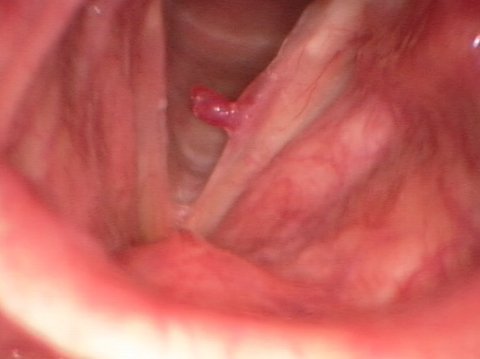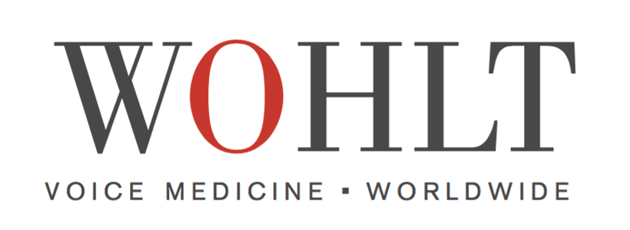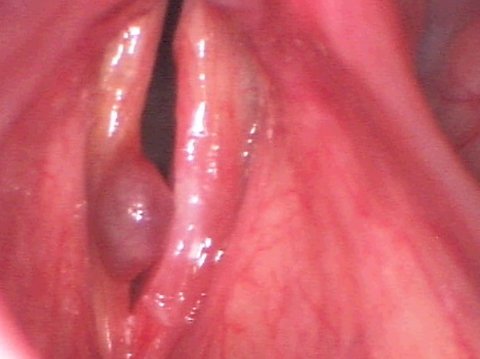What is a vocal cord polyp?
A vocal cord polyp is an abnormal, unilaterally growing tissue lesion of varying size and shape. Vocal cord polyps are basically differentiated into two types:
- Hemorrhagic polyps
- Gelatinous polyps
Hemorrhagic polyps are usually reddish-brown lesions that are vascularized by small capillaries, sometimes appearing like a blood blister. Thickened blood vessels on the vocal folds that run in the direction of these polyps are frequently also seen.
The type referred to as gelatinous polyps has a variously dimensioned pattern with a glass-like appearance and transparent surface structure.
In addition, a variety of polypous mixed forms can occur. Vocal fold polyps are usually localized in the mid- to anterior third of the vocal folds. Because they block vocal fold closure and cause impairment to vocal fold vibration, they produce varying degrees of impairing hoarseness.
Small hemorrhagic vocal cord polyp


How do vocal fold polyps develop?
Vocal fold polyps are basically the most common type of organic voice disorder; they mostly develop unilaterally, but in rare cases also bilaterally and are caused by overuse of the voice. Patients usually report having used their speaking or singing voice excessively prior to their symptoms.
In these cases, their voice overuse may have existed for a longer period of time, in other words, have become chronic. However, it is also possible that a singular event, called phonotrauma, has led to the formation of a vocal fold polyp.
In many cases, the development of a vocal fold polyp is associated with smoking. Vocal cord polyps occur in an overwhelming majority of men.
Large hemorrhagic vocal cord polyp


What symptoms do vocal cord polyps cause?
- Hoarse and rough voice
- Fluctuation between a hoarse and clear voice
- Rapid vocal fatigue
- Rarely: Respiratory complaints
Patients with vocal cord polyps mostly complain about a rough, hoarse voice, a limited ability for vocal exertion as well as rapid vocal fatigue.
Sometimes a polyp is pedunculated, in other words, it flaps in the respiratory flow like a pendulum. This means that the polyp is located between the two vocal cords, causing the hoarseness, but at times is also situated underneath the level of the vocal folds. When this is the case, the voice mostly sounds clear.
If a vocal fold polyp grows to a significant size, it can block the vocal folds completely, causing impairment to the patient's breathing.

What treatment options are available for vocal fold polyps?
- Voice surgery
Treatments that have no effect on the symptomatology:
- Pharmacotherapy
- Inhalation
- Voice therapy
By nature of their pathogenesis, vocal fold polyps cannot be treated by voice therapy. Therapeutic exercises can only help the patients to slightly compensate for their hoarseness in the early stages.
Essentially, it can be said that vocal cord polyps can only truly be treated successfully by a phonosurgical procedure (go to Voice Surgery for Vocal Cord Polyps).
Example of phonosurgical treatment for vocal cord polyps
Vocal cord polyps before surgery
Vocal cord polyps after surgery

Truths and Myths About Vocal Cord Polyps
A vocal cord polyp is basically not a form of vocal fold cancer. It should be pointed out, however, that cornification can form on the polyp surface in isolated cases.
Secondary malignant changes, therefore, cannot be ruled out with certainty in all cases. Furthermore, it is possible that vocal cord polyps can develop when vocal cord cancer is on the contralateral side.

Case Report: Vocal Cord Polyp
A 46-year-old car mechanic had been noticing increasing hoarseness for several months. He reported that his voice was hoarse and deep, that speaking and shouting in the auto workshop had become increasingly strenuous. His voice would tire much more quickly than it did several months ago.
The patient stated that he smokes around 10 cigarettes a day and has been doing so for over 20 years. When asked specifically, he remembered that some months previously he had to shout very loudly to be heard over the running car motors in the auto workshop. Afterwards, his voice kept getting worse and worse.
The videostroboscopic examination by the ENT specialist revealed a medium-sized hemorrhagic polyp on the right side; a contralateral indentation was noted at the edge of the left vocal fold. The vibrations of the right vocal fold were markedly interrupted compared to the left side. Vocal fold closure was no longer possible. His voice sounded rough and his average speaking pitch was markedly lowered.
The patient reported that he was no longer able to sing.
The patient was recommended to undergo a phonosurgical procedure. This would involve the surgical method of plastic reconstruction. After successful surgery and a 14-day vocal rest phase, both vocal folds exhibited smooth vocal fold margins, equilateral vibratory patterns as well as complete vocal fold closure.
His vocal quality was strong and clear and his average speaking pitch was markedly higher. The patient perceived his own voice to be the same as before the (phono)trauma he had suffered in the auto workshop. Despite emphatic insistence that he do so, the patient was unable to give up his smoking habit. However, in the future, he will refrain from loud speaking and shouting.




